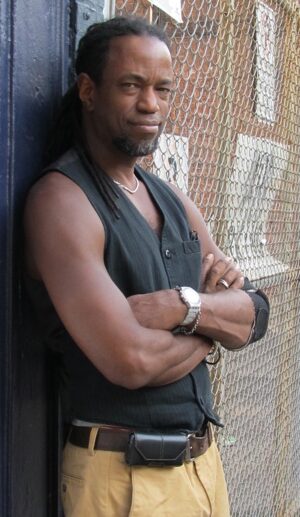
Bill Ware, Biography
An accomplished, vibraphonist, composer, bassist and producer, Bill Ware studied classical marimba at Montclair State University and jazz at the Harlem Jazzmobile Workshop under the tutelage of Barry Harris. In 1987, he joined the Jazz Passengers, the New York City avant-garde jazz septet founded by saxophonist Roy Nathanson and trombonist Curtis Fowlkes, featuring guitarist Marc Ribot, and performances with vocalists Deborah Harry, Mavis Staples, Elvis Costello, Jimmy Scott, Cuba Gooding, Bob Dorough and others.
Ware’s trio, Vibes, which began as house band of the Knitting Factory’s ‘Late-Night Hang’, for which Ware’s vibes playing was lauded by All About Jazz as brandishing “…the touch of a resilient, serpentine stylist, a master of quiet spectacle.” In the 1990’s Ware’s Club Bird All-Stars held a three-month residency at Club Bird in Yokohama, Japan, and later perform widely and record the album Long & Skinny which remains a classic of the genre. Bill also delved into the burgeoning acid jazz scene as an original member of Groove Collective, the seminal acid jazz band dominating the Giant Steps scene in New York City. While with, Groove Collective, Ware was ‘discovered’ by renowned Steely Dan producer Gary Katz who introduced Bill to Steely Dan, and from 1993-95, Ware toured with the Dan for its first live dates in a generation, recording the album Alive in America along the way.
Ware’s own projects in the new millennium include his Y2K Quartet which recorded Keeping Up with the Jones, also recording the Duke Ellington tribute Sir Duke as a duo with Marc Ribot.
Bill also formed the band Groove Thing, with saxophonist Jay Rodriguez from Groove Collective and featuring Debby Harry in two albums including The Adventure, and This is No Time. Ware went on to independently produce Deborah Harry and continue to take the helm for his own studio projects including for his full electric band.
As a sideman, Ware joined Bobby Previte’s New Bump Quartet and among many other collaborations, Ware recorded two albums as a member of the Rez Abbasi Acoustic Quartet, whose debut release Natural Selection earned four stars in Downbeat, among other accolades. After thrilling audiences at the 2010 Newport Jazz Festival, the Quartet embarked on international tours and later released their second album, Intents and Purposes in 2015. In 2018, Ware was invited by renowned bassist and composer, Mickey Bass, to join his New York Powerhouse Ensemble, a bebop sextet playing all Bass originals where Bill enjoys the supporting chordal role.
Beyond performance, Bill has made important inroads as a composer in both contemporary classical music and film scoring. His orchestral adventures began with a request for orchestrations of the Deborah Harry – Jazz Passengers songbook for performances with orchestra. He has also composed three classical symphonies, multiple concerti, numerous soundtracks and other works, including several hybrid classical/jazz projects of various iconic classical works by way of Ware’s jazz orchestrations in collaboration with cellist, Sara Wollan.
Ware’s film compositions, alone and in collaboration with Roy Nathanson, include scores to Martin and Orloff, Raising Victor Vargas, Undefeated, Excess Baggage, Singularity, and Hal Wilner’s A Tribute to Harold Arlen. He also arranged the Jazz Passengers’ music for their live performances set to the Universal cult classic, the Creature from the Black Lagoon.
In 2019, Bill moved to the Hudson Valley, New York and with the onset of the Covid-19 pandemic, shifted his focus towards film scoring once again. He composed an original score for the animated German, silent film by Charlotte “Lotte” Reiniger, The Adventures of Prince Achmed (1926) and in 2021 he composed and created a new original score for The Spanish Dancer (1923), a costume drama set in the Spanish court of King Philip the Fourth starring Pola Negri, commissioned by Milestone Films and the Eye FilmMuseum, released on BluRay in 2023.
In 2024, Bill took his Club Bird All-Stars into Van Gelder Recording Studio to record new compositions inspired partly by Bill’s film score work. The newest iteration of the Club Bird All-Stars will feature guitarist Rez Abbasi, with Matt King on piano, Jay Anderson on bass, and Taru Alexander on drums.
